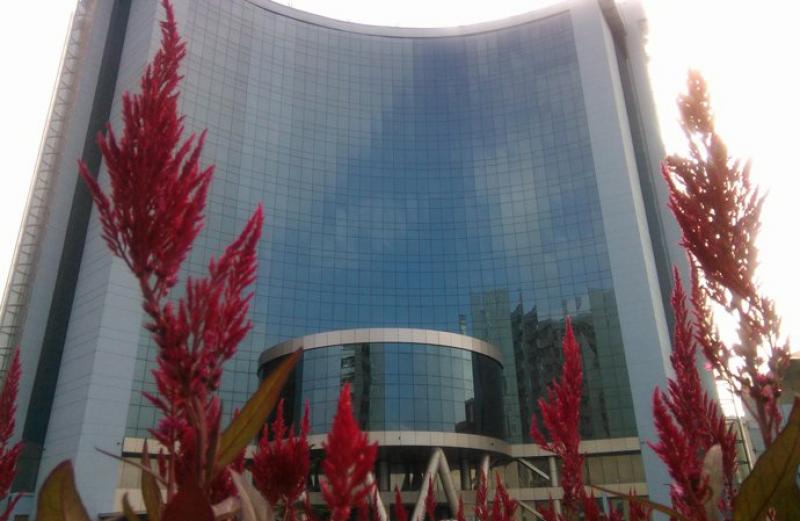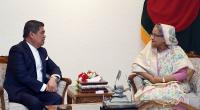 Ten years since the Awami League government came into power with a promise to technologically transform the nation with an agenda aptly titled “Digital Bangladesh”, the country has seen radical transformation in the arena of information and communication technology.
Ten years since the Awami League government came into power with a promise to technologically transform the nation with an agenda aptly titled “Digital Bangladesh”, the country has seen radical transformation in the arena of information and communication technology.
Under the leadership of Sheikh Hasina during her two consecutive terms as the prime minister, Bangladesh has become an emerging country in the technology world.
The government has also put a special emphasis on utilizing information and communication technology (ICT) as a tool for development and sustainability, reports Dhaka Tribune.
Despite many bottlenecks and limitations, work is in progress for the realization of Digital Bangladesh. Over the past nine years, the government has implemented a large number of projects relating to digital technologies.
In a bid to fulfill the aim to transform Bangladesh into a technologically advanced nation by 2021, the country has come a long way.
The country has seen exponential growth in internet connectivity, mobile phone usage, IT export earnings and use of ICT in education and accessibility of public services, driven by widespread digitization in the public and private sectors and policy support.
Creating jobs
ICT training by the government has opened a new horizon in youth employment through outsourcing.
According to a study conducted by Oxford University, Bangladesh is now home to around 16.8% of all outsourced online workers in the world, a rate that is second only to India, at 24.6%.
Under the Professional Outsourcing Training Program, the government has set a target for training 13,000 unemployed people in three key ICT areas: graphic design, web design and development, and digital marketing.
Of the target, a total of 11,920 people have already completed their training.
The business process outsourcing (BPO) industry in Bangladesh is growing at breakneck speed. The export revenue of the BPO industry has been growing rapidly. At present, the industry employs more than 40,000 educated Bangladeshi workers.
Towards universal access
Ten years ago only 20 million Bangladeshis had access to a mobile phone. As of April 2018, that number has grown to more than 150 million,.
The number of internet subscribers in Bangladesh as of April stood at 86 million, while the rates of tele-density and internet-density were 91% and 50% respectively.
According to the GSM Association, Bangladesh has the potential to be the 10th largest internet using country in the world by 2020.
Almost all services including those related to education, health- nutrition, agriculture, birth-registration, allowances under social protection programs are now easily and comfortably delivered to the doorsteps of intended beneficiaries through union information centres at union level, e-service centres in DC offices, e-centres in 147 upazilas and village post offices and 254 agricultural information centres.
As many as 18,434 government offices including 58 ministries or divisions, 240 government departments and 64 DC offices of the country are now connected with an integrated network.
A total of 883 video conferencing systems have been installed for live communication, sending messages and information, and conducting meetings.
As part of the agenda of Digital Bangladesh, the government is trying to ensure greater transparency in its work through measures such as the introduction of e-filing in government offices, application of e-GP in government procurement.
Massive IT infrastructure
The government has already planned to set up 12 IT parks at the district headquarters of Gopalganj, Mymensingh, Jamalpur, Rangpur and Barisal, Keraniganj in Dhaka, Comilla Sadar (South), Chittagong Port, Ramu in Cox’s Bazaar, Singra in Natore, Companiganj in Sylhet, and the KUET Campus in Khulna.
Around 8,000km of optical fibre cable has been installed across the country. A second submarine cable has been installed in Kuakata through which Bangladesh will get 1,500GB/s bandwidth.
In his budget speech in June, Finance Minister AMA Muhith reaffirmed that Digital Bangladesh is one of the key commitments of the government.
He said: “We built an extensive essential IT infrastructure for delivering quick and easy services to the doorsteps of the common in particular those who are marginalized.
“With our sincere endeavour, mobile network service could be introduced in all upazilas of three inaccessible hill districts, which is major leap forward towards socio-economic development in this region.”
Posts, Telecommunications and Information Technology Minister Mustafa Jabbar recently said all the union parishads across the country will be brought under digital connectivity within one year.
“In addition, a digital laboratory will be established in each of the educational institutions across the country,” the minister said.
The government has facilitated the growth of mobile banking, which launched in 2010. At the end of May, the average daily transactions through mobile banking amounted for more than Tk1,058 crore.
The latest achievement of Bangladesh is to enter to the space age through successful launching of the first satellite into space on 11th May, 2018, which gave Bangladesh a newer height in using information technology.
A Bangladeshi communications satellite named “Bangabandhu Satellite-1” was launched into orbit on May 11 from the Kennedy Space Center in Florida.
The satellite expands coverage over Bangladesh and its territorial waters in the Bay of Bengal, and can reach India, Nepal, Bhutan, Sri Lanka, the Philippines, Indonesia and parts of Central Asia.
Challenges
Although, the rapid development of ICT in Bangladesh is ongoing, the journey ahead for Digital Bangladesh will not be smooth, experts and government officials say.
According to State Minister for ICT Zunaid Ahmed Palak, the key obstacle in achieving “Digital Bangladesh” is lack of skilled human resources, and gaps between educational institutions and industrial sector.
“The prime minister has set four pillars to make Digital Bangladesh – developing human resources, connectivity, encouragement in industrial sector, and e-Governance,” he said.
“We heavily worked for e-Governance in the last years. We also worked on the strategies – local experience and global business. We also achieved mentionable success in connectivity (and) gained success in the human resources sector.”
Md Abdul Wahed Tomal, general secretary of E-Commerce Association of Bangladesh, said the Digital Bangladesh declaration, more than anything, had brought a big change to the mindset to the nation.
“The slogan served to inspire people (and) we can see now that internet usage has expanded,” he said.
“The government has provided various kinds of facilities, incentives, high-tech park, supporting local industry, which has helped service-oriented businesses expand. In particular, budgetary support for ICT was good.”
Syed Almas Kabir, president of Bangladesh Association of Software and Information Services (BASIS), said the government realized the importance of the ICT sector and put the digital Bangladesh agenda in their election manifesto ten years ago.
“Since taking office, they have kept their commitment by providing various policy supports to the ICT sector, reducing internet price, network expansion and other measures such as providing incentives and tax holidays to the IT industry,” he said.
“This is why the ICT sector is in a strong position at present. The government deserves praise for that.”
 National
National
30882 hour(s) 10 minute(s) ago ;
Afternoon 01:04 ; Thursday ; Apr 25, 2024
Digital Bangladesh not a dream anymore
Send
Shariful Islam
Published : 05:30, Jul 13, 2018 | Updated : 05:30, Jul 13, 2018
Published : 05:30, Jul 13, 2018 | Updated : 05:30, Jul 13, 2018
0 ...0 ...
/hb/
Topics: Top Stories
- KOICA donates medical supplies to BSMMU
- 5 more flights to take back British nationals to London
- Covid19: Rajarbagh, Mohammadpur worst affected
- Momen joins UN solidarity song over COVID-19 combat
- Covid-19: OIC to hold special meeting
- WFP begins food distribution in Cox’s Bazar
- WFP begins food distribution in Cox’s Bazar
- 290 return home to Australia
- Third charter flight for US citizens to return home
- Dhaka proposes to postpone D8 Summit
Unauthorized use of news, image, information, etc published by Bangla Tribune is punishable by copyright law. Appropriate legal steps will be taken by the management against any person or body that infringes those laws.
Bangla Tribune is one of the most revered online newspapers in Bangladesh, due to its reputation of neutral coverage and incisive analysis.
F R Tower, 8/C Panthapath, Shukrabad, Dhaka-1207 | Phone: 58151324; 58151326, Fax: 58151329 | Mob: 01730794527, 01730794528


